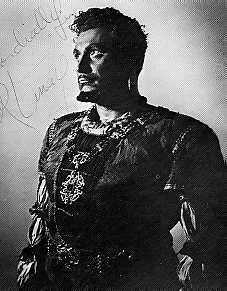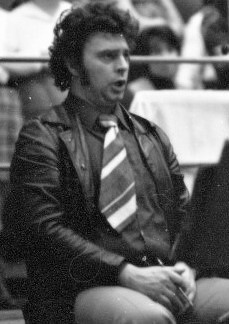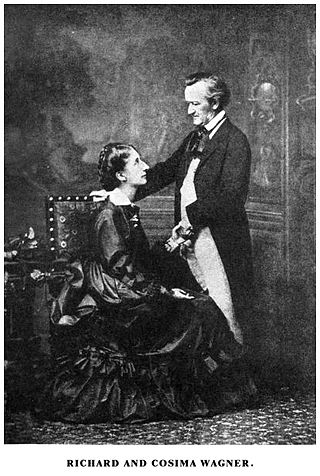
Lars Cleveman (born 16 June 1958) is a Swedish musician and opera singer.

Lars Cleveman (born 16 June 1958) is a Swedish musician and opera singer.
Together with Martin Rössel, Cleveman founded Sweden's first electronic underground group, Dom Dummaste. Additionally, Cleveman is a tenor opera singer, performing at the Royal Swedish Opera in Stockholm. He made his début at Covent Garden in 2009 as Tristan in Tristan und Isolde replacing an indisposed Ben Heppner and subsequently also sang at Bayreuther Festspiele during 2011. [1] In May 2013, Cleveman made his début at the Metropolitan Opera singing the role of Siegfried in the third of three performances of Wagner's Ring Cycle. [2]

Tristan und Isolde, WWV 90, is an opera in three acts by Richard Wagner to a German libretto by the composer, based largely on the 12th-century romance Tristan and Iseult by Gottfried von Strassburg. It was composed between 1857 and 1859 and premiered at the Königliches Hoftheater und Nationaltheater in Munich on 10 June 1865 with Hans von Bülow conducting. Wagner referred to the work not as an opera, but called it "eine Handlung".

The Bayreuth Festival is a music festival held annually in Bayreuth, Germany, at which performances of operas by the 19th-century German composer Richard Wagner are presented. Wagner himself conceived and promoted the idea of a special festival to showcase his own works, in particular his monumental cycle Der Ring des Nibelungen and Parsifal.

Ramón Vinay was a famous Chilean operatic tenor with a powerful, dramatic voice. He is probably best remembered for his appearances in the title role of Giuseppe Verdi's tragic opera Otello.
Gerhard Stolze was a German operatic tenor.

Dame Gwyneth Jones is a Welsh dramatic soprano, widely regarded as one of the greatest Wagnerian sopranos in the second half of the 20th century.
Wolfgang Windgassen was a heldentenor internationally known for his performances in Wagner operas.
Ludwig Suthaus was a German operatic heldentenor.
Sista Bussen is a Swedish record company founded in 1978 in Stockholm with a Gothenburg branch. They produced and published music, mainly progg and punk. In 1981 the Gothenburg section seceded into their own company called Last Buzz. Sista Bussen were mainly a DIY record company and the artists had to do much of the work themselves.

Bernd Weikl is an Austrian operatic baritone, particularly known for his performances in the stage works by Richard Wagner. He also has written books and directed operas.

Bernd Aldenhoff was a German Heldentenor.

The Bayreuth canon consists of those operas by the German composer Richard Wagner (1813–1883) that have been performed at the Bayreuth Festival. The festival, which is dedicated to the staging of these works, was founded by Wagner in 1876 in the Bavarian town of Bayreuth, and has continued under the directorship of his family since his death. Although it was not originally held annually, it has taken place in July and August every year since the 75th anniversary season in 1951. Its venue is the Bayreuth Festspielhaus, which was built for the first festival. Attendance at the festival is often thought of as a pilgrimage made by Wagner aficionados.

Set Svanholm was a Swedish operatic tenor, considered the leading Tristan and Siegfried of the first decade following World War II.
This is an audio and video discography of Tristan und Isolde, an opera by Richard Wagner which was first performed on 10 June 1865 in Munich.
Gary Lehman is an American operatic tenor, specialising in the Heldentenor repertoire.
Carlos Alexander was a dramatic baritone and stage director of opera, best known as a singing-actor in German repertoire.
Gerd Brenneis was a German operatic tenor who had an active international career from the late 1950s through the 1990s. Known for his interpretations of the works of Richard Wagner, he worked as a principal artist at many of the world's great opera houses, including the Deutsche Oper Berlin, La Scala, the Metropolitan Opera, and the Vienna State Opera.

Andreas Schager is an Austrian operatic tenor. He began his career as a tenor for operettas, but has developed into singing Heldentenor parts by Richard Wagner including Tristan, Siegmund, Siegfried and Parsifal. A member of the Staatsoper Berlin, he has appeared internationally at venues including La Scala, The Proms and the Bayreuth Festival.
John Otto Lundgren is a Swedish dramatic baritone opera singer.

Franz-Josef Selig is a German operatic bass.
Spas Wenkoff was a Bulgarian-Austrian operatic tenor. He was known internationally for mastering the heldentenor roles by Wagner, such as Tristan and Tannhäuser. He appeared in his signature role Tristan first in 1975 at the Staatsoper Dresden, followed by the centenary Bayreuth Festival in 1976, and the Metropolitan Opera in 1981, among many others. He was a member of the Staatsoper Berlin from 1976 to 1984, and then appeared freelance at major opera houses. He was awarded the title Kammersänger in both Berlin and Vienna.